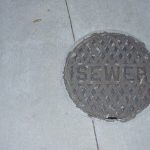Many drain lines and water supply pipes are hidden behind a wall or located under a sink and it’s easy to take them for granted. But, when something goes wrong, it can lead to a costly repair bill which you will want to avoid. Preventative maintenance is a great way to prevent water leaks and drain clogs and it can extend the useful lifespan of your home plumbing system. In this article, we will take a look at three pro plumbing maintenance tips to keep your water lines in great shape.
1. Don’t Use Chemical Cleaners
When you have a clogged drain and you need to get it working quickly, it’s natural to look for a quick fix. For many people, this is a chemical drain cleaner that’s located under their kitchen sink. But, this is a bad option because these cleaning products contain harsh chemicals that can burn your skin and damage your pipes. The truth is that these “cleaners” don’t work all that well and in many cases the clog returns later. Many homeowners respond with more drain cleaner, which only makes the situation worse.
A professional plumber will always choose a manual clog removal method over harsh chemicals. Try shifting a small drain clog with a cup plunger. If that doesn’t work, try your own homemade cleaner using baking soda, vinegar and warm water to flush the system clean. If the clog remains, you can try a plumbing augur or snake which you feed into the drain to break the clog apart. If you cannot remove the clog, it’s time to call your local certified plumber to remove it for you safely.
2. Drain Clog Prevention
A drain clog is an annoyance. The backed up water places extra pressure on your pies and clearing away the fouled water is a real nuisance. But, you can avoid many drain clogs, if you adopt a preventative mindset that is shared with everyone in the home. There are many items and materials that are placed in drains that should go in the trash instead. Avoid placing grease and food debris in kitchen drains and fit a drain cover in each sink to protect the drain. In the bathroom, avoid flushing anything except human waste and toilet paper. Flushable wipes are not flushable at all and they are a common cause of toilet clogs.
3. Respect Your Garbage Disposal
Your garbage disposal unit is designed to deal with small quantities of food scraps and there are certain materials that should never be placed in them. Some prime examples of materials that should go in the trash, include: egg shells, coffee grinds, oils, grease, fibrous and stringy organic matter, bones and harder scraps of food. When you’re using the garbage disposal, keep the cold water running during and for a few seconds after you’re finished. This will help the unit to dispose of any final food particles and the drain pipe will be flushed clean.
If you have drain clogs that are hard to remove or a blocked garbage disposal, contact your local certified plumber today.





